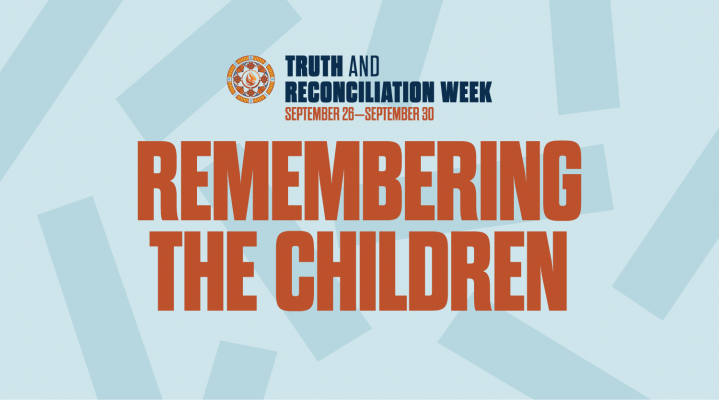
The theme for this year's Truth and Reconciliation Week is “Remembering the Children." We memorialize the children lost to the residential school system and honour Survivors and their families. Learning and commemorating the truth of our history from First Nations, Métis, and Inuit knowledge keepers is an important part of the path to Reconciliation.
This week is an opportunity to listen and learn from Indigenous survivors, elders, artists, and leaders from across the country. Middlesex County remains committed to Truth and Reconciliation and this week provides an opportunity for the County to continue our journey in support of the reconciliation process.
As September 30th approaches, please take the time to reflect on the history and legacy of Residential Schools.
Below are educational resources and activities you can take part in to further your learnings:
- To learn more about the Residential Schools in Canada, the Canadian Encyclopedia is a great resource. Click here to read more.
- To learn more about the history of the treaties, this Canadian Government page explains it here.
- Click here for an interactive map that can show all Indigenous territories, Languages and Treaties.
- The National Centre for Truth and Reconciliation shares an Exhibit of the Residents School Timeline on this page.
- The National Centre for Truth and Reconciliation shares an Exhibit on The Survivor’s Flag. Click here to read more.
- Watch documentaries/films here by renowned Abenaki filmmaker, Alanis Obomsawin.
- Watch the CBC News: The National video titled Stolen Children | Residential School survivors speak out. Watch here.
- North American Traditional Indigenous Elder and Knowledge Keeper Wa Wa Tei Ikwe shares some of her teachings with CTRI (Crisis & Trauma Resource Institute) in a video series, Spirit Guide Teachers
-
Reading resources, Books and Podcasts
- Where are the Children? Healing the legacy of the residential schools (Aboriginal Healing Foundation and Legacy of Hope Foundation)
- Book: A Knock on the Door. The Essential History of Residential Schools from the Truth and Reconciliation Commission of Canada
- Book: In This Together: Fifteen Stories Of Truth And Reconciliation
- Listen to Historica Canada podcast Residential Schools Podcast Series - YouTube
- Listen to the Coffee With My Ma podcast by Kaniehtiio Horn.
We encourage you to take time to read, watch and listen to the various educational resources provided above.
Support is available if you, or someone you know, needs help or support.
Orange Shirt Day
This Friday, September 30th not only commemorates the National Day for Truth and Reconciliation, it also coincides with Orange Shirt Day.
What is Orange Shirt Day?
Orange Shirt Day is an Indigenous-led day to honour and raise awareness of the individual, family and community inter-generational impacts of residential schools. Orange Shirt Day also allows for the continuation of dialogue on the tragic effects of residential schools, to listen to stories of survivors, to remember those who did not make it home, to offer an opportunity for learning, and to bring people, institutions, and governments together in the spirit of reconciliation.
How Did Orange Shirt Day Begin?
On September 30, 2013, Phyllis Webstad shared her story at the St. Joseph Mission (SJM) residential school commemoration event in Williams Lake, BC. When Phyllis was 6 years old, she was excited to wear her new orange shirt to her first day of residential school. The orange shirt was given to her by her grandmother. When Phyllis arrived at school, her new orange shirt was taken from her and she never saw it again.
To learn more about Phyllis Webstad’s story, please visit: Phyllis' Story. You can also watch a video here of Phyllis Webstad explaining the story of her experience at Residential School and the start of Orange Shirt Day in Canada.
Why Wear Orange?
The orange shirt is a symbol of the stripping away of culture, freedom and self-esteem experienced by Indigenous children over generations, and the slogan “Every Child Matters” was chosen to recognize that the children who attended residential schools felt that they did not matter.
We invite you to wear orange in solidarity as a symbol of remembrance and to honour the thousands of survivors of residential schools.
For Survivors and Their Families
- A National Residential School Crisis Line is available to provide support to former Residential School students and their families. You can access emotional and crisis referral services by calling the free of charge 24-Hour National Crisis Line at 1-866-925-4419.
- Indigenous peoples across Canada can also connect with The Hope for Wellness Help Line 24 hours a day, seven days a week for counselling and crisis intervention. Call the toll-free help line at 1-855-242-3310 or connect to the online chat.
- Talk4Healing is a culturally grounded, fully confidential help line available in 14 languages for Indigenous women in Ontario. Call the toll-free number at 1-855-554-HEAL (4325).
- Free and confidential mental health support is available to anyone who may be affected
